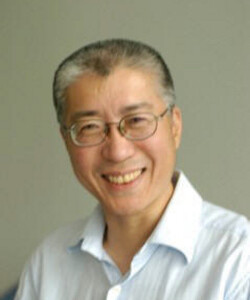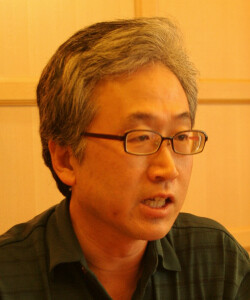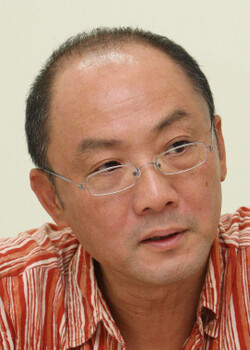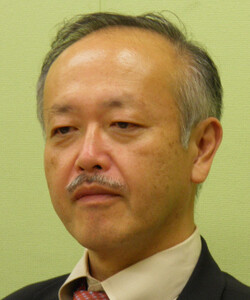hankyoreh
Links to other country sites 다른 나라 사이트 링크
East Asian civic groups launch campaign to calm territorial disputes

By Park Min-hee, Beijing correspondent
A signature-seeking campaign designed to overcome prolonged territorial disputes has been started by groups of concerned citizens across East Asia.
The East Asian Civic Forum, consisting of intellectuals and civilians from South Korea, China, Taiwan, and Japan, declared in a statement, “Standing before history, let’s solve disputes and move toward peace”. They will begin gathering signatures in each country at the same time next week. This is part of civil society’s efforts to collect voices for peace and find alternative solutions while contemplating the historical origins of today’s crisis so that recent territorial disputes do not give rise to nationalistic or military tensions.

The campaign is being led by Professor Chen Guang Sheng of Shanghai Jiao Tong University of Taiwan at the helm, Prof. Lee Dae-hoon of Sungkonghoe University (NGO studies, member of Democratic Professor Association International Solidarity Committee), Atsushi Okamoto, former editor in chief of Sekai magazine of Japan, Nohira Shinsaku, representative of Peace Boat, Prof. Wakabayashi Jiyo of Japan’s Okinawa University, Prof. Wang Xiaoming of Shanghai University, and Prof. Han Jialing of Beijing Academy of Social Sciences.
In an email interview with the Hankyoreh on Oct. 24, Prof. Chen said, “I hope the solidarity and signature campaign in East Asia can ease tensions in the region and act as a chance to inform the people that the government is not the only group that has power to make decisions concerning this issue. There are other opinions in civilian society.” He went on to say, “I hope this campaign will pave the way for other experiences and sentiments within East Asia to be exchanged and understood, and lay the groundwork for future common understanding.”

East Asia has in recent months been swept up in territorial disputes and nationalist conflicts. Since South Korean President Lee Myung-bak’s visit to the Dokdo Islets in August, the conflict between South Korea and Japan has escalated. After the Japanese government’s move to nationalize the Senkaku islands (called Diaoyudao by China) in September, China has seen massive anti-Japan demonstrations.
Japanese intellectuals, including Nobel laureate Kenzaburo Oe and civil groups issued a statement calling for a “break in the vicious cycle of territorial conflict” on Sept. 28. Subsequently, intellectuals and civil activists from South Korea, Japan, China and Taiwan held the “East Asian Civic Forum” in Taipei on Oct. 6, in which they agreed to collect the opinions of the citizens of East Asia on territorial disputes and push ahead with this signature-seeking campaign.
Prof. Lee Dae-hoon, who participated in the forum said, “The campaign is focused on the goal of uniting East Asian civil society and preventing territorial disputes from escalating while resolving the situation in a non-militaristic and peaceful way. We must not allow territorial disputes to be used to satisfy imperialistic power or agression.” He added, “The campaign was started with intellectuals at the center, but we will gather citizens’ signatures in the next few months. Based on citizens’ opinions, we will lead activities to seek and propose solutions on these territorial conflicts.”

The statement prepared by activists of each country for signature campaign includes following aims: to convert disputed islands into “living areas for nearby residents,” and “demilitarized zones of East Asia”; to direct the public of each region to monitor whether each country’s government eases national fervor over the territorial issues and curbs militaristic tendencies; to support Japanese and South Korean protests against the U.S. military bases, and urge the government to sign onto a “regional peace and safety agreement” while having the U.S. resolve problems caused by the U.S. military base; and to resolve conflicts and strife and move toward a lasting peace across East Asia, standing before historical wounds.
Please direct questions or comments to [english@hani.co.kr]

Editorial・opinion
![[Column] Has Korea, too, crossed the Rubicon on China? [Column] Has Korea, too, crossed the Rubicon on China?](https://flexible.img.hani.co.kr/flexible/normal/500/300/imgdb/original/2024/0419/9317135153409185.jpg) [Column] Has Korea, too, crossed the Rubicon on China?
[Column] Has Korea, too, crossed the Rubicon on China?![[Correspondent’s column] In Japan’s alliance with US, echoes of its past alliances with UK [Correspondent’s column] In Japan’s alliance with US, echoes of its past alliances with UK](https://flexible.img.hani.co.kr/flexible/normal/500/300/imgdb/original/2024/0419/2317135166563519.jpg) [Correspondent’s column] In Japan’s alliance with US, echoes of its past alliances with UK
[Correspondent’s column] In Japan’s alliance with US, echoes of its past alliances with UK- [Editorial] Does Yoon think the Korean public is wrong?
- [Editorial] As it bolsters its alliance with US, Japan must be accountable for past
- [Guest essay] Amending the Constitution is Yoon’s key to leaving office in public’s good graces
- [Editorial] 10 years on, lessons of Sewol tragedy must never be forgotten
- [Column] A death blow to Korea’s prosecutor politics
- [Correspondent’s column] The US and the end of Japanese pacifism
- [Guest essay] How Korea turned its trainee doctors into monsters
- [Guest essay] As someone who helped forge Seoul-Moscow ties, their status today troubles me
Most viewed articles
- 1[Column] The clock is ticking for Korea’s first lady
- 2Samsung barricades office as unionized workers strike for better conditions
- 3S. Korea, Japan reaffirm commitment to strengthening trilateral ties with US
- 4[News analysis] After elections, prosecutorial reform will likely make legislative agenda
- 5[Editorial] When the choice is kids or career, Korea will never overcome birth rate woes
- 6Japan officially says compensation of Korean forced laborers isn’t its responsibility
- 7[Editorial] As it bolsters its alliance with US, Japan must be accountable for past
- 8Why Israel isn’t hitting Iran with immediate retaliation
- 9[Column] Has Korea, too, crossed the Rubicon on China?
- 10All eyes on Xiaomi after it pulls off EV that Apple couldn’t